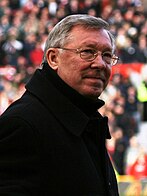Coronation of Queen Alexandra
On 1 August 2019, after a roughly two-year-long period of preparation and rehearsal, Alexandra was coronated as Queen of the British at Westminster Abbey, the traditional coronation site for British monarchs. Her coronation, the second in British history to involve a female sovereign after that of Queen Mary III's in 1702, notably saw a major shift in its overall tone and setting, with changes including the act of homage in which senior male members of the royal family would kneel and pay homage to the new monarch being officially discontinued, as well as the notable inclusion of figures from other major religious faiths, namely Islam, Judaism, Hinduism, Buddhism, and Sikhism, to reflect the United Kingdom's "modern multireligious society". In addition to that, her subsidiary title of "Defender of the Faith", which traditionally reflects the monarch's role as a protector of the Christian faith in the United Kingdom, was modified to a more "inclusive" version, that is "Defender of the Faiths", a change that, in the words of Prime Minister David Cameron, "reflects a modern and more multicultural Britain, one that is vastly different than the Britain of the 20th century while at the same time affirming the monarch's longstanding role as the leader of the Anglican faith". Similarly, the usage of the more updated introductory phrase of "by the Grace of God and the Will of the People", which first came into use under the reign of King Frederick was also retained, and which was meant to emphasise a delicate balance between the traditional concept of the divine right of kings and the more modern concept of a popular monarchy that was first popularised in the United Kingdom by the Queen's great-grandfather King Frederick in an attempt to "modernise" the institution.
Much like that of her predecessors, Alexandra's coronation saw the usual attendance of various foreign guests from many countries around the world, namely the presidents of France, South Africa, Bahrain, Germany, Israel, and Indonesia, as well as the sovereigns of Spain, Portugal, Hungary, Greece, Italy, the United Arab Emirates, Libya, and Japan, among others. In addition to this, a number of celebrities and athletes were also featured at the coronation, namely the Queen's former Arsenal and England teammates, singers Adele, John Legend, Katy Perry, Mick Jagger, and Harry Styles, as well as actors Hugh Grant, Emma Watson, Morgan Freeman, and Angelina Jolie. Moreover, owing to her personal connections with football, notable sports figures David Beckham, Harry Kane, Mia Hamm, Alex Morgan, and Sir Alex Ferguson were also in attendance along with non-footballing athletes including Serena Williams, Rafael Nadal, Tiger Woods, and Michael Phelps. Beginning at 10:00 a.m., the Queen, riding in the Gold State Coach with her mother sitting beside her, traveled to the coronation site of Westminster Abbey in the presence of a large procession made up of members of the British Armed Forces. Following her arrival at the site, in a religious ceremony led by the Archbishop of Canterbury Justin Welby, Alexandra was formally coronated as Queen of the British, with the guests in attendance unanimously proclaiming "God Save the Queen" in response, the first of such instance in almost three hundred years since the coronation of Queen Mary III in 1708.
Meanwhile, despite the overwhelming positivity, the coronation was not without its controversies as republican and anti-monarchist protests sprang up across London in anticipation of the event although these were quickly dealt with by authorities. Meanwhile, for either political or social reasons, despite the array of high-profile guests in attendance, some were otherwise reportedly excluded from the ceremony. Among those included US President Donald Trump, reportedly due to his wide unpopularity among Britons at large, and Russian President Vladimir Putin, owing to recent memories of the Salisbury poisonings, with both leaders instead being substituted by Vice President Mike Pence and Prime Minister Dmitry Medvedev respectively. Meanwhile, despite effectively being his father's deputy abroad, Saudi Crown Prince Mohammed bin Salman was reportedly excluded from the event, a decision most likely influenced by lingering outrage over the crown prince's alleged role in the assassination of Saudi journalist and dissident Jamal Khashoggi the previous year. Instead, Prince Khalid bin Bandar Al Saud, the Saudi ambassador to the United Kingdom, was allowed to represent his government at the coronation given that the elderly King Salman himself was deemed physically unable to attend the coronation on his own.
In a first for a royal coronation, the ceremony was subsequently followed by a live concert at Windsor Castle the following day featuring a considerable number of well-known British musical acts of various genres, namely Elton John, Dua Lipa, Ed Sheeran, Ellie Goulding, Queen, Blue, Adele, Slick Rick, Sting, and The Rolling Stones. Then, on 10 August 2019, under the Queen's own initiative, an exhibition match was held in her honour at Wembley Stadium pitting the England men's and women's national teams against one another and who are captained by Harry Kane and Steph Houghton respectively. In the end, the women's team defeated the men's team 2-1 in which winger Beth Mead provided both a goal and an assist, resulting in her later being named player of the match. With an official attendance of 88,543 spectators, the event successfully raised a rough total of £5.7 million, with the entirety of the proceeds being subsequently channeled towards further developing football for both men and women. In the meantime, a grand one-off football tournament, officially named the Premier Cup, was held in the months leading up to her coronation that featured a total of sixteen clubs with Premier League champions Liverpool eventually emerging victorious by defeating Bundesliga champions Bayern Munich 3-1 in the finals while Bundesliga runners-up Borussia Dortmund defeated Premier League runners-up Manchester City 5-4 on penalties in a dramatic fashion to secure a third-place finish.
Perhaps most significantly, the coronation itself also saw the very first instance of the United Kingdom's new national anthem "Onwards, Britannia!" being sung in public, with the very first instance being the moment shortly after the Archbishop of Canterbury had placed St Edward's Crown onto the Queen's head, in which the attendees and choir members inside the abbey proceeded to sing the new national anthem in unison. First conceived as a viable and popular alternative to the longstanding "God Save the King", the song was later jointly composed by Master of the Queen's Music Judith Weir and noted German composer Hans Zimmer whose well-documented success and reputation as a film score composer in Hollywood led the Queen to personally tap the former into jointly composing the new national anthem, a choice that she later explained, stating, "For anyone with even the slightest knowledge of Hollywood films, Hans Zimmer is indisputably a great talent whose works are universally well-acclaimed and which have also won a number of awards themselves. With that in mind, how many countries today can claim that a man of such brilliance and talent has had a part in composing their national anthem? None, per se, except for the United Kingdom, which would absolutely both stand out and be much delighted with such an honour". To that end, Zimmer himself was then prominently featured at the coronation and would even later receive an Order of the British Empire award for his part in composing "Onwards, Britannia!".





